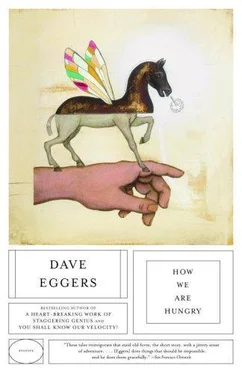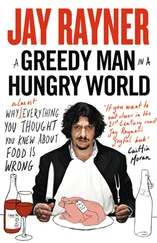Dave Eggers - How We Are Hungry
Здесь есть возможность читать онлайн «Dave Eggers - How We Are Hungry» весь текст электронной книги совершенно бесплатно (целиком полную версию без сокращений). В некоторых случаях можно слушать аудио, скачать через торрент в формате fb2 и присутствует краткое содержание. Год выпуска: 2005, Издательство: Vintage Canada, Жанр: Современная проза, на английском языке. Описание произведения, (предисловие) а так же отзывы посетителей доступны на портале библиотеки ЛибКат.
- Название:How We Are Hungry
- Автор:
- Издательство:Vintage Canada
- Жанр:
- Год:2005
- ISBN:нет данных
- Рейтинг книги:3 / 5. Голосов: 1
-
Избранное:Добавить в избранное
- Отзывы:
-
Ваша оценка:
- 60
- 1
- 2
- 3
- 4
- 5
How We Are Hungry: краткое содержание, описание и аннотация
Предлагаем к чтению аннотацию, описание, краткое содержание или предисловие (зависит от того, что написал сам автор книги «How We Are Hungry»). Если вы не нашли необходимую информацию о книге — напишите в комментариях, мы постараемся отыскать её.
A Heartbreaking Work of Staggering Genius
How We Are Hungry — читать онлайн бесплатно полную книгу (весь текст) целиком
Ниже представлен текст книги, разбитый по страницам. Система сохранения места последней прочитанной страницы, позволяет с удобством читать онлайн бесплатно книгу «How We Are Hungry», без необходимости каждый раз заново искать на чём Вы остановились. Поставьте закладку, и сможете в любой момент перейти на страницу, на которой закончили чтение.
Интервал:
Закладка:
At the hotel she wanted a drink. She went to the hotel bar alone, something she’d never done, and sat on a stool next to a stenographer from Brussels. The stenographer, whose name she did not catch and couldn’t ask for again, wore a short inky bob of black coarse hair and was wringing her napkin into tortured shapes, tiny twisted mummies. The stenographer: face curvy and shapeless like a child’s, voice melodious, accent soothing. They talked about capital punishment, the stenographer comparing the stonings common to some Muslim regions with America’s lethal injections and electric chairs. Somehow the conversation was cheerful and relaxed. They had both seen the same documentary about people who had witnessed executions, and had been amazed at how little it had seemed to affect any of them, the watchers; they were sullen and unmoved.
To witness a death! Rita could never do it. Even if they made her sit there, behind the partition, she would close her eyes and hum songs about candy.
Rita was tipsy and warm when she said good night to the Brussels stenographer, who held her hand too long with her cold slender fingers. Through the French doors and Rita was outside, walking past the pool toward her mud hut, one of twelve behind the hotel. She passed a man in a plain and green uniform with a gun strapped to his back, an automatic rifle of some kind, the barrel poking over his shoulder and in the dim light seeming aimed at the base of his skull. She didn’t know why the man was there, and didn’t know if he would shoot her in the back when she walked past him, but she did, she walked past him, because she trusted him, trusted this country and the hotel — that together they would know why it was necessary to have a heavily armed guard standing alone by the pool, still and clean, the surface dotted with leaves. She smiled at him and he did not smile back and she only felt safe again when she had closed the hut’s door and closed the door to the tiny bathroom inside and was sitting on the cool toilet with her hands caressing her toes.
Morning comes like a scream through a pinhole. Rita is staring at the concentric circles of bamboo that comprise the hut’s conical roof. She is lying still, hands crossed on her chest — she woke up that way — and through the mosquito net, too tight, terrifying, suffocating in a small way when she thinks too much about it, she can see the concentric circles of the roof above and the circles are twenty-two in number, because she has counted and recounted. She counted while lying awake, listening to someone, outside the hut, fill bucket after bucket with water.
Her name is Rita. Her hair is red like a Romanian’s and her hands are large. Eyes large and mouth lipless and she hates, has always hated, her lipless mouth. As a girl she waited for her lips to appear, to fill out, but it never happened. Every year since her sixteenth birthday her lips have not grown but receded. The circles make up the roof but the circles never touch. Her father had been a pastor.
Last night she thought, intermittently, she knew why she was in Tanzania, in Moshi, at the base of Kilimanjaro. But this morning she has no clue. She knows she is supposed to begin hiking up the mountain today, in two hours, but now that she has come here, through Amsterdam and through the cool night from the airport, sitting silently alone the whole drive, an hour or so at midnight, next to Godwill — really his name was Godwill, an old man who was sent by the hotel to pick her up, and it made her so happy because Godwill was such a… Tanzanian-sounding name — now that she has come here and is awake she can not find the reason why she is here. She cannot recall the source of her motivation to spend four days hiking up this mountain, so blindingly white at the top — a hike some had told her was brutalizing and often fatal and others had claimed was actually just a walk in the park. She was not sure she was fit enough, and was not sure she would not be bored to insanity. She was most concerned about the altitude sickness. The young were more susceptible, she’d heard, and at thirty-eight she was not sure she was that anymore — young — but she felt that for some reason she in particular was always susceptible and she would have to know when to turn back. If the pressure in her head became too great, she would have to turn back. The mountain was almost twenty thousand feet high and every month someone died of a cerebral edema and there were ways to prevent this. Breathing deeply would bring more oxygen into the blood, into the brain, and if that didn’t work and the pain persisted, there was Diamox, which thinned the blood and accomplished the same objective but more quickly. But she hated to take pills and had vowed not to use them, to simply go down if the pain grew intolerable — but how would she know when to go down? What were the phases before death? She might at some point realize that it was time to turn and walk down the mountain, but what if it was already too late? It was possible that she would decide to leave, be ready to live at a lower level again, but by then the mountain would have had its way and there, on a path or in a tent, she would die.
She could stay in the hut. She could go to Zanzibar and drink in the sun. She liked nothing better than to drink in the sun. With strangers. To drink in the sun! To feel the numbing of her tongue and limbs while her skin cooked slowly, and her feet dug deeper into the powdery sand! Drunk in the sun she felt communion with all people and knew they wished her the best.
Her hands are still crossed on her chest, and the filling of the buckets continues outside her hut, so loud, so constant. Is someone taking the water meant for her shower? At home, in St. Louis, her landlord with the beaver-fur coat was always taking her water — so why shouldn’t it be the same here, in a hut in Moshi, with a gecko, almost translucent, darting across her conical ceiling, its ever-smaller circles never interlocking?
She has bought new boots, expensive, and has borrowed a backpack, huge, and a Therm-a-rest, and sleeping bag, and cup, and a dozen other things. Everything made of plastic and Gore-Tex. The items were light individually but together very heavy and all of it is packed in a large tall purple pack in the corner of the round hut and she doesn’t want to carry the pack and wonders why she’s come. She is not a mountain climber, and not an avid hiker, and not someone who needs to prove her fitness by hiking mountains and afterward casually mentioning it to friends and colleagues. She likes racquetball.
She has come because her younger sister, Gwen, had wanted to come, and they had bought the tickets together, thinking it would be the perfect trip to take before Gwen began making a family with her husband, Brad. But Gwen had gone ahead and gotten pregnant anyway, early, six months ahead of schedule and now she could not make the climb. She could not make the climb but that did not preclude — Gwen used the word liberally and randomly, like some use curry — her, Rita, from going. The trip was not refundable, so why not go?
Rita slides her hands from her chest to her thighs and holds them, her thin thighs, as if to steady them. Who is filling the bucket? She imagines it’s someone from the shanty behind the hotel, stealing the hot water from the heater. She’d seen a bunch of teenage boys back there. Maybe they’re stealing Rita’s shower water. This country is so poor. Poorer than any place she’s been. Is it poorer than Jamaica? She is not sure. Jamaica she expected to be like Florida, a healthy place benefiting from generations of heavy tourism and the constant and irrational flow of American money. But Jamaica was desperately poor almost everywhere and she understood nothing.
Maybe Tanzania is less poor. Around her hotel are shanties and also well-built homes with gardens and gates. There is a law here, Godwill had said in strained English, that all the men are required to have jobs. Maybe people chose to live in spartan simplicity. She doesn’t know enough to judge one way or the other. The unemployed go to jail! Godwill had said, and seemed to like this law. He said this and then laughed and laughed.
Читать дальшеИнтервал:
Закладка:
Похожие книги на «How We Are Hungry»
Представляем Вашему вниманию похожие книги на «How We Are Hungry» списком для выбора. Мы отобрали схожую по названию и смыслу литературу в надежде предоставить читателям больше вариантов отыскать новые, интересные, ещё непрочитанные произведения.
Обсуждение, отзывы о книге «How We Are Hungry» и просто собственные мнения читателей. Оставьте ваши комментарии, напишите, что Вы думаете о произведении, его смысле или главных героях. Укажите что конкретно понравилось, а что нет, и почему Вы так считаете.












